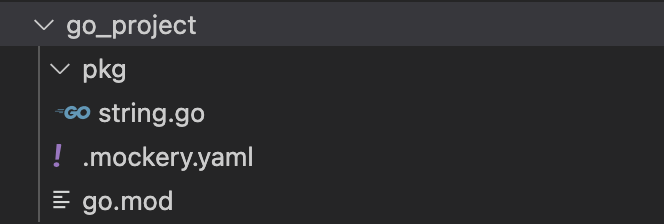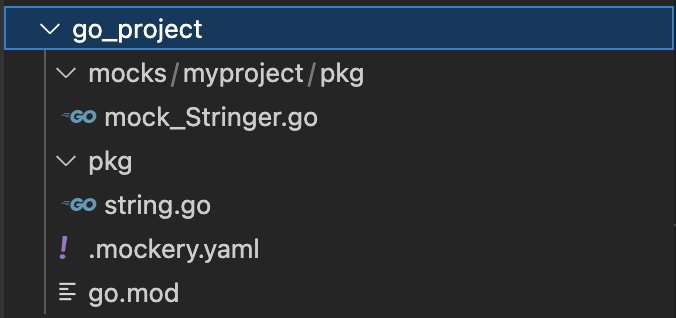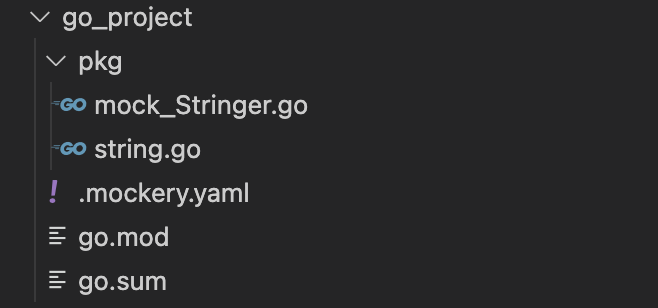Introducing Mockery's New packages Feature¶
vektra/mockery is a Go package that auto-generates mock implementations of interfaces in your project. For those not familiar with what mockery is, please take a look at its documentation page. I took over the project in 2020 and have overseen a number of significant feature updates to the code. The most recent of these is a feature I call packages, and it's one I'm most proud of due to the enormous benefits it grants you.
Previous State of the Art¶
Previously, the way one might tell mockery to generate mock implementations would be to use go:generate directives in your code. Example:
package pkg
//go:generate mockery --name Stringer
type Stringer interface {
String() string
}
You would then call go generate at the top of your project. Go would recursively iterate through your .go files to find all instances of go:generate and execute the command listed. This would induce mockery to generate the mock specified in the --name parameter.
The problem with this approach is multi-faceted:
- It's incredibly slow for large projects. Mockery would call
packages.Loadonce per file, which means it's parsing the entire syntax tree for a package multiple times with little to no caching. - It's inflexible. Many Github issues were created throughout the years requesting new features for esoteric and specific use-cases that existed purely because mockery didn't give people the tools they need to generate the mocks how they wanted. The config model itself was wrong.
- It's verbose. You have to do quite a lot of writing if your configuration is complex or varies based on each config.
- It's incohesive. You have many go generate statements spread across your repo, which makes it hard to quickly determine the extent of your mock generation. There is also no strict requirement that
go:generatestatements are next to your interface, they can be placed literally anywhere in your project.
My experience as maintainer of this project over the years gave me the insight I needed to fix the problems people were having. The most painful issue was almost always the first (performance), followed closely by the second (inflexibility).
What is packages?¶
packages is simply a feature that changes the configuration model to be more cohesive with how abstract syntax tree parsing works in Go, and provides more flexibility and control over how mocks are generated. As mentioned before, the primary concern was with calling packages.Load multiple times per project, when it really only should be called once for the entire project (irrespective of how many packages you're actually parsing).
Let's go back to our example of Stringer:
Using packages, you could tell mockery to generate a mock for this in config:
We can then call mockery with no arguments1:
You will see that mockery has now generated a separate mocks folder with the mock_Stringer.go file:
The end result is largely the same, however the configuration file gives you an incredibly powerful way to specify the configs.
Why do you want packages?¶
-
It's blazing fast. The mockery project dogfoods itself and has found that usage of
packagesresults in a 5x increase in speed. Your performance increase could be even higher. You can see first-hand testimonials of people trying out the alpha and beta releases ofpackages: https://github.com/vektra/mockery/discussions/549 -
Its configuration options allow huge control over what, where, and how your mocks are generated.
- The config model is hierarchical! The body of config options can be specified at the top of the yaml to specify default values, at the package level, and at the interface level. These config options are merged hierarchically, which means it's more DRY-compliant.
- Many of the config options use the Go templating engine, which allows you to reference dynamic runtime parameters.
The performance benefit comes from the fact that mockery now gathers all of the packages to load (that are either statically defined or dynamically discovered through recursive) and passes that list to a single packages.Load invocation. Most other mock generator packages, even the officially supported gomock project, do not do this, which means mockery should now be orders of magnitude faster than any other solution.
Useful links:
- feature documentation
- configuration options available for more details.
- migrating to
packages
Advanced Examples¶
Using all: true¶
Take for example the mockery project itself, which contains a huge number of interfaces in github.com/vektra/mockery/v2/fixtures that are used for integration testing. Instead of manually specifying each individual interface we want to generate mocks for, we can simply do something like:
This tells mockery we want all the interfaces to be included in mock generation. You can see the output of this run here.
Using recursive: true¶
There may also be cases where you have a large number of packages, and you don't want to specify each individual package in config. If you use recursive: true, you can specify the top-level package and let mockery auto-discover all of the subpackages beneath. Again, the mockery project has an example of this, using these interfaces.
packages:
github.com/vektra/mockery/v2/pkg/fixtures/recursive_generation:
config:
recursive: True
all: True
Usage of templated variables to specify alternate locations¶
By default, mockery places all mocks into a separate mocks/ folder. However, you can use the template variables to specify alternate locations for your mocks, for example adjacjent to where the interface is defined. This can be useful to resolve cyclic import issues. The docs show us the config you need to use to achieve this:
- The
InterfaceDirtemplate variable specifies that the directory of the mock file should be the same as the original interface. - The
PackageNametemplate variable is, unsurprisingly, the package name of the original interface. Because we are generating the mock in the same directory as the interface, it has to also have the same package name. - We have to explicitly tell mockery that the mock is generated "in-package" because the types and variables it references don't need to be imported; they're already in the same package as the mock itself.
Going back to our toy example, here is the config we'd want:
dir: "{{.InterfaceDir}}"
outpkg: "{{.PackageName}}"
inpackage: true
packages:
myproject/pkg:
config:
all: true
After running mockery, you see that the mock is generated adjacent to the string.go file:
Multiple mocks generated from the same interface¶
There may also be cases where you want multiple mocks with differing config from the same interface. This is also supported. The mockery project provides an example of this:
packages:
github.com/vektra/mockery/v2/pkg/fixtures:
config:
all: True
interfaces:
RequesterVariadic: # (1)!
config:
with-expecter: False
configs:
- mockname: RequesterVariadicOneArgument # (2)!
unroll-variadic: False
- mockname: RequesterVariadic
unroll-variadic: True
- Even though we're specifying
all: true, we can still override specific interfaces. - Each list element here must contain a
mocknameto differentiate it from the parent interface. We also specify a differentunroll-variadicargument to each one.
External Packages¶
Of course, you can still specify external interfaces to be mocked. If you can go get it, you can mock it!
Feedback¶
Please try this out and let me know your thoughts in the comments below. I worked hard on this feature and it turned out really well, so I hope you enjoy it.
I also want to thank everyone who has contributed to this project over the years. Most of the features in mockery have been implemented by the open source community, and I've only served as an advisor and button pusher for most of it. So thanks for making this project what it is, open source works well when done correctly!
-
You may note the mockery logs are saying the packages feature in a beta state. At the time of this writing, this is true, however it will be fully released a short time after this is published. ↩



